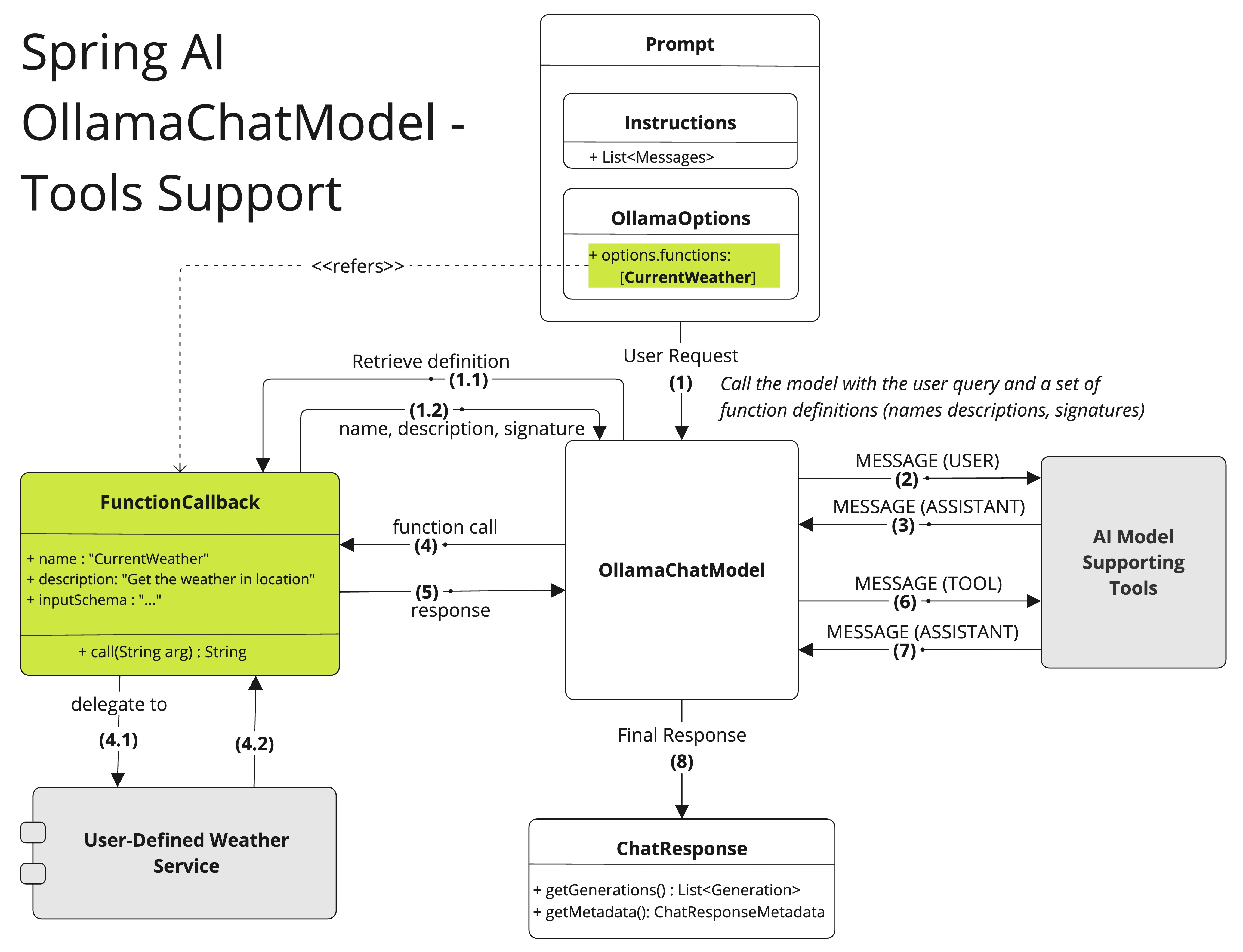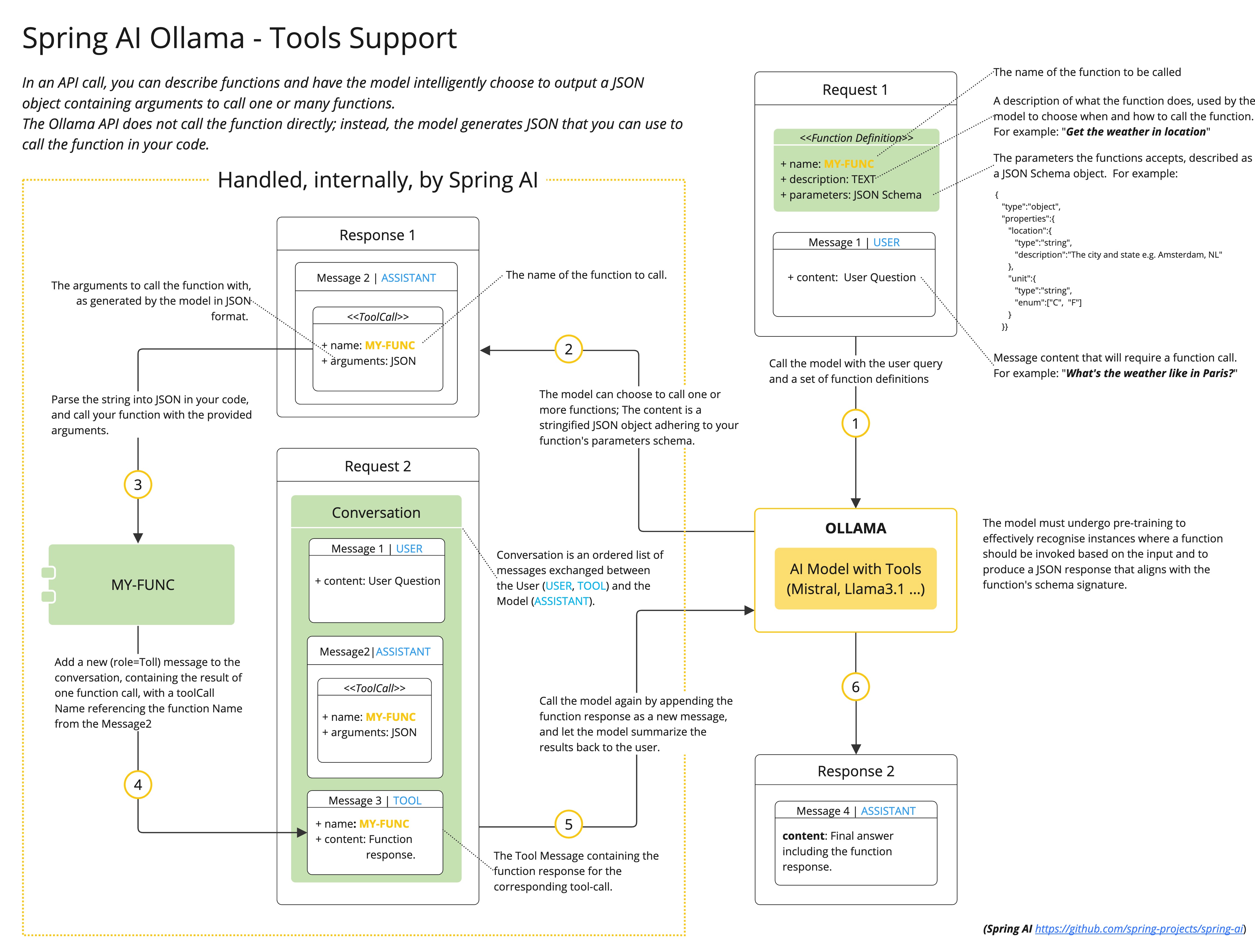Ollama Function Calling (Deprecated)
| This page describes the previous version of the Function Calling API, which has been deprecated and marked for remove in the next release. The current version is available at Tool Calling. See the Migration Guide for more information. |
| You need Ollama 0.2.8 or newer to use the functional calling capabilities and Ollama 0.4.6 or newer to use them in streaming mode. |
You need Models pre-trained for Tools support.
Usually, such models are tagged with a Tools tag.
|
You can register custom Java functions with the OllamaChatModel and have the Ollama deployed model intelligently choose to output a JSON object containing arguments to call one or many of the registered functions.
This allows you to connect the LLM capabilities with external tools and APIs.
The Ollama models tagged with the Tools label (see full list) are trained to detect when a function should be called and to respond with JSON that adheres to the function signature.
The Ollama API does not call the function directly; instead, the model generates JSON that you can use to call the function in your code and return the result back to the model to complete the conversation.
Spring AI provides flexible and user-friendly ways to register and call custom functions.
In general, the custom functions need to provide a function name, description, and the function call signature (as JSON schema) to let the model know what arguments the function expects.
The description helps the model to understand when to call the function.
As a developer, you need to implement a function that takes the function call arguments sent from the AI model, and responds with the result back to the model. Your function can in turn invoke other 3rd party services to provide the results.
Spring AI makes this as easy as defining a @Bean definition that returns a java.util.Function and supplying the bean name as an option when invoking the ChatModel.
Under the hood, Spring wraps your POJO (the function) with the appropriate adapter code that enables interaction with the AI Model, saving you from writing tedious boilerplate code. The basis of the underlying infrastructure is the ToolCallback.java interface and the companion Builder utility class to simplify the implementation and registration of Java callback functions.
How it works
Suppose we want the AI model to respond with information that it does not have, for example, the current temperature at a given location.
We can provide the AI model with metadata about our own functions that it can use to retrieve that information as it processes your prompt.
For example, if during the processing of a prompt, the AI Model determines that it needs additional information about the temperature in a given location, it will start a server-side generated request/response interaction. The AI Model invokes a client side function. The AI Model provides method invocation details as JSON, and it is the responsibility of the client to execute that function and return the response.
The model-client interaction is illustrated in the Spring AI Function Calling Flow diagram.
Spring AI greatly simplifies the code you need to write to support function invocation.
It brokers the function invocation conversation for you.
You can simply provide your function definition as a @Bean and then provide the bean name of the function in your prompt options.
You can also reference multiple function bean names in your prompt.
Quick Start
Let’s create a chatbot that answer questions by calling our own function. To support the response of the chatbot, we will register our own function that takes a location and returns the current weather in that location.
When the model needs to answer a question such as "What’s the weather like in Boston?" the AI model will invoke the client providing
the location value as an argument to be passed to the function. This RPC-like data is passed as JSON.
Our function calls some SaaS based weather service API and returns the weather response back to the model to complete the conversation.
In this example, we will use a simple implementation named MockWeatherService that hard-codes the temperature for various locations.
The following MockWeatherService.java represents the weather service API:
public class MockWeatherService implements Function<Request, Response> {
public enum Unit { C, F }
public record Request(String location, Unit unit) {}
public record Response(double temp, Unit unit) {}
public Response apply(Request request) {
return new Response(30.0, Unit.C);
}
}Registering Functions as Beans
With the OllamaChatModel Auto-Configuration you have multiple ways to register custom functions as beans in the Spring context.
We start by describing the most POJO-friendly options.
Plain Java Functions
In this approach, you define a @Bean in your application context as you would any other Spring managed object.
Internally, Spring AI ChatModel will create an instance of a ToolCallback that adds the logic for it being invoked via the AI model.
The name of the @Bean is passed as a ChatOption.
@Configuration
static class Config {
@Bean
@Description("Get the weather in location") // function description
public Function<MockWeatherService.Request, MockWeatherService.Response> currentWeather() {
return new MockWeatherService();
}
}The @Description annotation is optional and provides a function description that helps the model understand when to call the function. It is an important property to set to help the AI model determine what client side function to invoke.
Another option for providing the description of the function is to use the @JsonClassDescription annotation on the MockWeatherService.Request:
@Configuration
static class Config {
@Bean
public Function<Request, Response> currentWeather() { // bean name as function name
return new MockWeatherService();
}
}
@JsonClassDescription("Get the weather in location") // // function description
public record Request(String location, Unit unit) {}It is a best practice to annotate the request object with information such that the generated JSON schema of that function is as descriptive as possible to help the AI model pick the correct function to invoke.
ToolCallback
Another way to register a function is to create a ToolCallback like this:
@Configuration
static class Config {
@Bean
public FunctionToolCallback weatherFunctionInfo() {
return FunctionToolCallback.builder("CurrentWeather", new MockWeatherService()) // (1) function name
.description("Get the weather in location") // (2) function description
.inputType(MockWeatherService.Request.class) // (3) function signature
.build();
}
}It wraps the 3rd party MockWeatherService function and registers it as a CurrentWeather function with the OllamaChatModel.
It also provides a description (2) and the function signature (3) to let the model know what arguments the function expects.
| By default, the response converter performs a JSON serialization of the Response object. |
The FunctionToolCallback internally resolves the function call signature based on the MockWeatherService.Request class.
|
Specifying functions in Chat Options
To let the model know and call your CurrentWeather function you need to enable it in your prompt requests:
OllamaChatModel chatModel = ...
UserMessage userMessage = new UserMessage("What's the weather like in San Francisco, Tokyo, and Paris?");
ChatResponse response = this.chatModel.call(new Prompt(this.userMessage,
OllamaOptions.builder().tools("CurrentWeather").build())); // Enable the function
logger.info("Response: {}", response);The above user question will trigger 3 calls to the CurrentWeather function (one for each city) and the final response will be something like this:
Here is the current weather for the requested cities: - San Francisco, CA: 30.0°C - Tokyo, Japan: 10.0°C - Paris, France: 15.0°C
The OllamaFunctionCallbackIT.java test demo this approach.
Register/Call Functions with Prompt Options
In addition to the auto-configuration, you can register callback functions, dynamically, with your Prompt requests:
OllamaChatModel chatModel = ...
UserMessage userMessage = new UserMessage("What's the weather like in San Francisco, Tokyo, and Paris?");
var promptOptions = OllamaOptions.builder()
.toolCallbacks(List.of(FunctionToolCallback.builder("CurrentWeather", new MockWeatherService()) // (1) function name and instance
.description("Get the weather in location") // (2) function description
.inputType(MockWeatherService.Request.class) // (3) function signature
.build())) // function code
.build();
ChatResponse response = this.chatModel.call(new Prompt(this.userMessage, this.promptOptions));| The in-prompt registered functions are enabled by default for the duration of this request. |
This approach allows you to dynamically choose different functions to be called based on the user input.
The FunctionCallbackInPromptIT.java integration test provides a complete example of how to register a function with the OllamaChatModel and use it in a prompt request.
Appendices:
Spring AI Function Calling Flow
The following diagram illustrates the flow of the OllamaChatModel Function Calling:

OllamaAPI Function Calling Flow
The following diagram illustrates the flow of the Ollama API:

The OllamaApiToolFunctionCallIT.java provides a complete example on how to use the Ollama API function calling.

